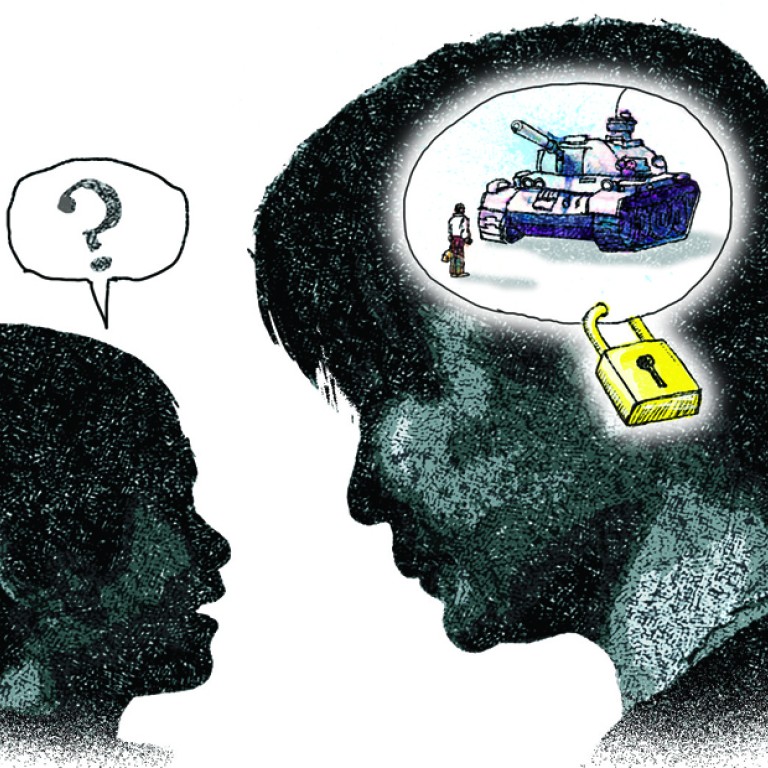
China's youth, its leaders of tomorrow, cannot remain ignorant of Tiananmen
Daniel Hong says reluctance of mainland Chinese to discuss the events of 1989 stems from both fear and shame, and open discussion would help foster trust in the government
In the aftermath of the demonstrations and subsequent massacre on June 4, 1989, which resulted in hundreds, and perhaps thousands, of deaths as well as many thousands of arrests, Jeff Widener of the Associated Press took the famous "Tank Man" photograph from the balcony of a hotel room.
Today, this Pulitzer Prize finalist is widely regarded as one of post-Mao Zedong China's most iconic images - but not in mainland China.
Approaching the 25th anniversary of the Tiananmen Square massacre, the event is still unrecognised on the mainland. The government and its censored educational and media organisations don't talk about it because they are afraid of political unrest.
The generation that witnessed the demonstrations doesn't talk about it because they are afraid of repercussions. The result of this is that my generation, the millennials, is uninformed about an important part of our country's history.
I, a first-generation immigrant born in Beijing, did not know about the massacre until I read William Bell's in Grade 7 English class. After school that day, I asked my mother about the event. She stuttered, dismissed it as "political turbulence", and changed the subject.
I refused to let it go. Eventually, she gave in, retrieved a printout of Widener's Tank Man, and recounted what happened in 1989.
I was surprised when I found out that my parents - students at the University of Electronic Science and Technology of China in Chengdu - had taken part in the demonstrations. I heard a story of my father, a reserved and reticent man, with his face painted, waving the Chinese flag on top of a car.
Following the government crackdown on protesters, my parents hid in the countryside for a period. It was a heavy but interesting dinner-table conversation. However, one question lingered: why were my parents reluctant to talk about such an important part of China's history and of their lives?
Most participants in the demonstrations, in fact, remain silent. This is not so surprising within mainland China, where public discussion of the event can be detrimental to one's career and even to the careers of relatives.
Outside China, however, many demonstrators who have emigrated still don't talk about it. Those like my parents feel ashamed; after many years of thought, they wonder whether their actions were misguided by youthful passion. After all, they protested because they love their country. A fundamental principle that Chinese people are raised on is , literally, love for one's country. My parents feared that if I knew about the government's actions in Tiananmen, this principle would not be instilled in me.
The result of this widespread lack of discussion, however, is the eradication of an important period in Chinese history for the people to whom it matters the most: the future generation of China. I remember the confused response from a friend in Beijing when I showed him Widener's Tank Man: "Is this from North Korea or from Soviet Russia?"
History is important because reflecting on the past bridges generations and allows us to understand what causes society's successes and failures.
Educating China's youth about the country's full history, not just about the heroics of Chairman Mao and the People's Liberation Army that currently populate high school textbooks, is therefore vital to producing a knowledgeable, relevant generation that is connected to its nation's roots and thus capable of leading our country's future growth.
The Communist Party does not want to confront its mistakes because it is afraid of political unrest. It shouldn't be. Rather, it should be confident that its decisions and commitment that took China from poverty to one of the most powerful nations in the world will speak to the population.
My parents, in fact, defended the government's decision in 1989: "If the military was not brought in and the Communist Party was toppled, who knows where we would be?"
Indeed, according to the International Monetary Fund, China's gross domestic product has increased more than 20-fold since 1990 and household wealth and quality of life have also significantly improved.
While the party will inevitably be condemned if it openly discusses its past, the alternative is worse: an uninformed, ignorant population incapable of leading our country.
Open discussion would produce a generation that trusts the government and has the knowledge to lead our country to a stable, prosperous future. It is a good trade-off.
